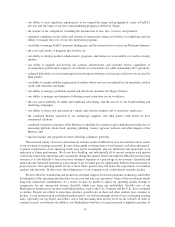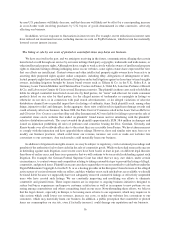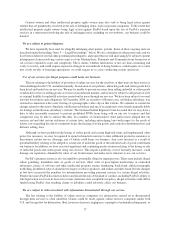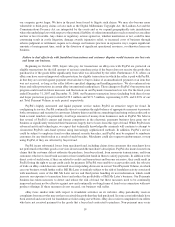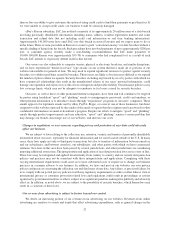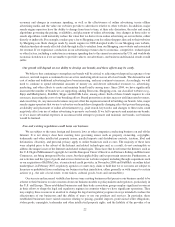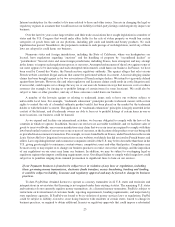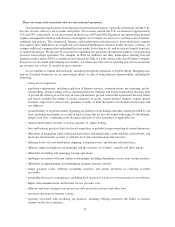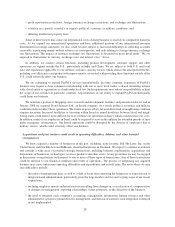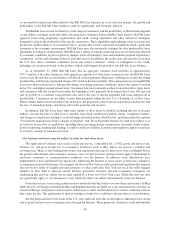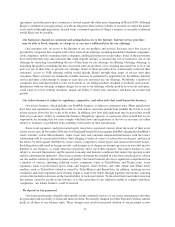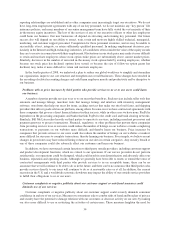eBay 2008 Annual Report Download - page 32
Download and view the complete annual report
Please find page 32 of the 2008 eBay annual report below. You can navigate through the pages in the report by either clicking on the pages listed below, or by using the keyword search tool below to find specific information within the annual report.cost on PayPal. Any change to PayPal’s business practices that makes the service less attractive to customers or
prohibits its use by residents of a particular jurisdiction could decrease the velocity of trade on eBay, which would
further harm our business.
Although there have been no definitive interpretations to date, PayPal has assumed that its service is subject to
the Electronic Fund Transfer Act and Regulation E of the Federal Reserve Board. As a result, among other things,
PayPal must provide advance disclosure of changes to its service, follow specified error resolution procedures and
reimburse consumers for losses above $50 from transactions not authorized by the consumer. PayPal currently
voluntarily reimburses consumers for all financial losses from transactions not authorized by the consumer, not just
losses above $50. PayPal seeks to pass most of these losses on to the relevant merchants, but PayPal incurs losses if
the merchant does not have sufficient funds in its PayPal account.
PayPal is also subject to anti-money laundering and counter-terrorist financing laws and regulations that
prohibit, among other things, its involvement in transferring the proceeds of criminal activities. Although PayPal
has adopted a program to comply with these laws and regulations, any errors or failure to implement the program
properly could lead to lawsuits, administrative action, and prosecution by the government. PayPal is also subject to
regulations that require it to report suspicious activities involving transactions of $2,000 or more and may be
required to obtain and keep more detailed records on the senders and recipients in certain transfers of $3,000 or
more. The interpretation of suspicious activities in this context is uncertain. Future regulations under the USA
PATRIOT Act may require PayPal to revise the procedures it uses to verify the identity of its customers and to
monitor international transactions more closely. As PayPal localizes its service in other countries, additional
verification and reporting requirements may apply, which in some cases are more stringent. Several countries,
including Australia, Canada, Luxembourg and Singapore, have implemented or are in the process of implementing
new anti-money laundering and counter-terrorist financing laws and regulations, and the impact of these laws and
regulations on PayPal’s business is uncertain. PayPal could be required, among other things, to learn more about its
customers before opening an account, to obtain additional verification of customers and to monitor its customers’
activities more closely. These requirements could impose significant costs on PayPal, make it more difficult for new
customers to join its network and reduce the attractiveness of its product. Failure to comply with federal, state or
foreign money laundering and counter-terrorist financing laws could result in significant criminal and civil lawsuits,
penalties, and forfeiture of significant assets.
While PayPal currently allows its customers with credit cards to send payments from 190 markets, only 65 of
those markets (including the U.S.) allow its customers to receive payments, in some cases with significant
restrictions on the manner in which customers can withdraw funds. These limitations may affect PayPal’s ability to
grow in these markets.
Of the 190 markets whose residents can use the PayPal service, 31 (27 countries plus four French overseas
departments) are members of the European Union (EU). Since 2007, PayPal has provided localized versions of its
service to customers in the EU through PayPal (Europe) S.A.R.L. et Cie, SCA., a wholly-owned subsidiary of
PayPal that is licensed as a bank in Luxembourg. Accordingly, PayPal (Europe) is subject to significant fines or
other enforcement action if it violates the disclosure, reporting, anti-money laundering, capitalization, funds
management, corporate governance or other requirements imposed on Luxembourg banks. PayPal has limited
experience in operating as a bank, and any fines or other enforcement actions imposed by the Luxembourg regulator
could adversely affect PayPal’s business. PayPal (Europe) implements its localized services in EU countries
through an expedited “passport” notification process through the Luxembourg regulator to regulators in other EU
member states pursuant to EU Directives, and has completed the “passport” notice process in all EU member
countries. The regulators in these countries could notify PayPal (Europe) of local consumer protection laws that will
apply to its business, in addition to Luxembourg consumer protection law, and could also seek to persuade the
Luxembourg regulator to order PayPal (Europe) to conduct its activities in the local country through a branch office.
Any such responses from these regulators could increase the cost of, or delay, PayPal’s plans for expanding its
business.
In markets other than the U.S., EU, Australia and China, PayPal serves its customers through PayPal Private
Ltd., a wholly-owned subsidiary of PayPal that is based in Singapore. In many of these markets, it is not clear
whether PayPal’s Singapore-based service is subject to Singaporean law or, if it is subject to local laws, whether
24


